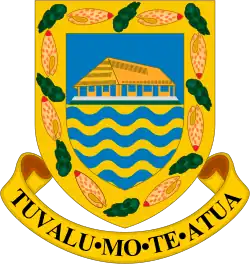| ||||||||||
All 16 seats in Parliament | ||||||||||
|---|---|---|---|---|---|---|---|---|---|---|
| ||||||||||
| ||||||||||
 |
|---|
|
|
General elections will be held in Tuvalu on 26 January 2024.[1][2] As there are no political parties in Tuvalu, all candidates run as independents. Incumbent Prime Minister Kausea Natano assumed office in 2019, having ousted Enele Sopoaga in a parliamentary vote. In November 2023, Natano signed the Falepili Union treaty, which sought to allow Tuvaluans displaced by climate change to immigrate to Australia. Opponents, including Sopoaga, claimed the treaty would threaten Tuvaluan sovereignty as it would permit Australia veto power over Tuvalu's foreign security arrangements.
Background
The previous election, held in 2019, saw high turnover among the 16 members of parliament, seven of whom were first-term members. Several cabinet ministers lost their seats. There were two female candidates; one secured a seat.[3] In the vote for prime minister, held shortly after the election, parliament elected Kausea Natano, defeating the incumbent head of government Enele Sopoaga, who had served since 2013.[4][5] The defeat of Sopoaga, who was pro-Taiwan, sparked fears that the new prime minister would sever ties with Taipei in favour of China. Fellow Pacific island country, the Solomon Islands, had made the switch days before.[6] However, Prime Minister Natano later assured that Tuvalu would maintain its diplomatic ties and recognition of Taiwan.[4] Samuelu Teo, son of the country's first Governor-General Fiatau Penitala Teo, was elected parliament speaker.[5]
Falepili Union treaty
In November 2023, Prime Minister Katano signed the Falepili Union treaty with Australia. A significant factor of the treaty grants a pathway for Tuvaluan citizens facing displacement from climate change to immigrate to Australia. In exchange, the agreement allows Australia veto power over Tuvalu's foreign security agreements.[7] Katano said the treaty was essential in preserving Tuvalu's identity.[8] However, former Prime Minister Sopoaga claimed the Falepili Union would undermine the country's sovereignty and vowed to repeal it should he head a government again after the election.[7] Sopoaga emphasised the sensitivity of conserving the sovereignty of the Pacific Island nations amidst a period where bigger countries, such as the United States and China, are competing for influence in the region. Former Foreign Minister Simon Kofe also criticised the treaty and pledged to renegotiate with Australia. Kofe highlighted Tuvalu's contracts with numerous international companies, including those that provide the country with satellite connections and questioned if it were necessary for Tuvalu to require Australia's permission to engage with such companies.[9]
Electoral system
The 16 members of parliament are elected from eight two-seat constituencies via plurality block voting.[10][11][4] As there are no formal political parties in Tuvalu, all candidates contest as independents.[9] Candidates are required to be Tuvaluan citizens and at least 21 years old. If, by the registration deadline, no more than two eligible candidates have registered to run in a constituency, these nominees are then, on that day, declared by law to be elected. Candidates have until the day before the election to withdraw if they wish to. All citizens aged 18 and older are eligible to vote; voting is not compulsory.[12][11]
References
- ↑ "Tuvalu Prepares for Democratic Transition with Upcoming Elections". BNN Breaking. 29 November 2023. Retrieved 2 December 2023.
- ↑ Marinaccio, Jess (29 November 2023). "Tuvalu's parliament debates the Falepili Union". Development Policy Centre. Archived from the original on 30 November 2023. Retrieved 30 November 2023.
- ↑ "Tuvalu elections: large turnover for new parliament". Radio New Zealand. 10 September 2019. Archived from the original on 18 June 2023. Retrieved 21 July 2023.
- 1 2 3 "Election results". Inter-Parliamentary Union. Archived from the original on 28 May 2023. Retrieved 21 July 2023.
- 1 2 "Kausea Natano new PM of Tuvalu; Sopoaga ousted". Radio New Zealand. 19 September 2019. Archived from the original on 8 March 2023. Retrieved 21 July 2023.
- ↑ "Tuvalu parliament picks new PM in potential blow for Taiwan". Al Jazeera. 19 September 2019. Archived from the original on 26 May 2023. Retrieved 21 July 2023.
- 1 2 Lewis, Lydia (29 November 2023). "Ex-Tuvalu PM running for office in 2024 will 'throw away' Falepili Treaty". Radio New Zealand. Archived from the original on 29 November 2023. Retrieved 30 November 2023.
- ↑ Lewis, Lydia (14 November 2023). "Australia-Tuvalu treaty is 'to maintain our identity', Kausea Natano says". Radio New Zealand. Archived from the original on 29 November 2023. Retrieved 30 November 2023.
- 1 2 Needham, Kirsty (8 December 2023). "Tuvalu politician who stood in rising sea wants changes to Australia migration treaty". Reuters. Sydney. Archived from the original on 14 December 2023. Retrieved 14 December 2023.
- ↑ "Electoral system". archive.ipu.org. Inter-Parliamentary Union. Archived from the original on 3 February 2023. Retrieved 31 December 2023.
- 1 2 "Electoral system". Inter-Parliamentary Union. Archived from the original on 19 September 2023. Retrieved 5 December 2023.
- ↑ "Electoral Provisions (Parliament) Act". Act of 2008 (PDF). Parliament of Tuvalu. pp. 8, 10, 12. Archived (PDF) from the original on 23 September 2020. Retrieved 5 December 2023.